University Nursing Reflection Report on EU Directives
VerifiedAdded on 2022/11/28
|9
|2330
|183
Report
AI Summary
This report is a nursing reflection addressing the European Union (EU) Directives for nursing, covering experiences in mental health and psychiatry, childcare and paediatrics, learning disability, home nursing, and care of the elderly. The student reflects on each area, providing insights into the care of patients with schizophrenia, newborns, dyslexia, post-surgery hip replacement, and dementia, respectively. The reflections include details on patient care, treatment strategies, and the importance of effective communication, family involvement, and maintaining patient dignity. Each reflection is supported by relevant references, demonstrating the application of theoretical knowledge to practical nursing scenarios and highlighting the importance of empathy, respect, and sensitivity in patient care. The report emphasizes the role of nurses in various settings and the importance of adapting care to meet the unique needs of each patient population.
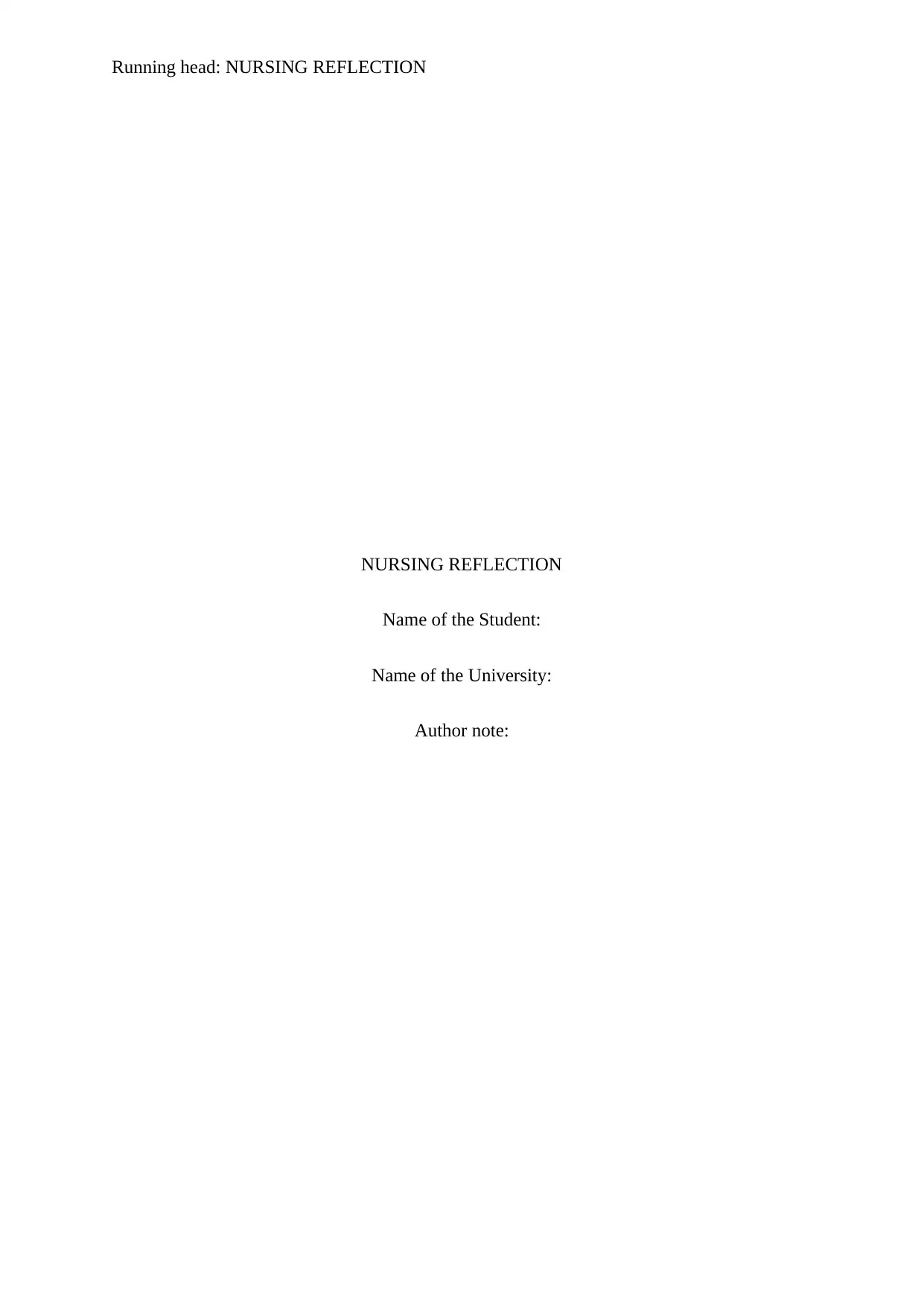
Running head: NURSING REFLECTION
NURSING REFLECTION
Name of the Student:
Name of the University:
Author note:
NURSING REFLECTION
Name of the Student:
Name of the University:
Author note:
Paraphrase This Document
Need a fresh take? Get an instant paraphrase of this document with our AI Paraphraser
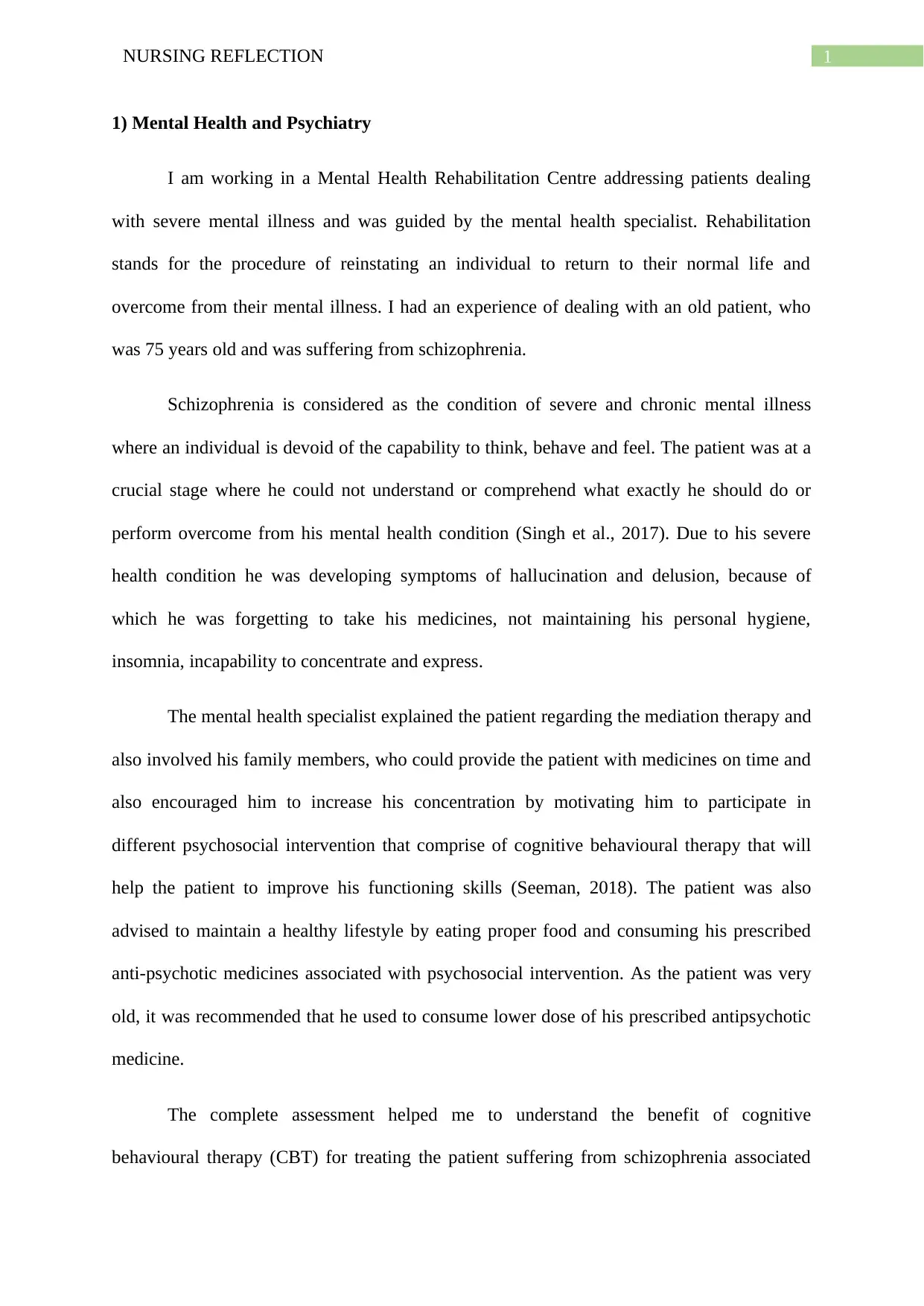
1NURSING REFLECTION
1) Mental Health and Psychiatry
I am working in a Mental Health Rehabilitation Centre addressing patients dealing
with severe mental illness and was guided by the mental health specialist. Rehabilitation
stands for the procedure of reinstating an individual to return to their normal life and
overcome from their mental illness. I had an experience of dealing with an old patient, who
was 75 years old and was suffering from schizophrenia.
Schizophrenia is considered as the condition of severe and chronic mental illness
where an individual is devoid of the capability to think, behave and feel. The patient was at a
crucial stage where he could not understand or comprehend what exactly he should do or
perform overcome from his mental health condition (Singh et al., 2017). Due to his severe
health condition he was developing symptoms of hallucination and delusion, because of
which he was forgetting to take his medicines, not maintaining his personal hygiene,
insomnia, incapability to concentrate and express.
The mental health specialist explained the patient regarding the mediation therapy and
also involved his family members, who could provide the patient with medicines on time and
also encouraged him to increase his concentration by motivating him to participate in
different psychosocial intervention that comprise of cognitive behavioural therapy that will
help the patient to improve his functioning skills (Seeman, 2018). The patient was also
advised to maintain a healthy lifestyle by eating proper food and consuming his prescribed
anti-psychotic medicines associated with psychosocial intervention. As the patient was very
old, it was recommended that he used to consume lower dose of his prescribed antipsychotic
medicine.
The complete assessment helped me to understand the benefit of cognitive
behavioural therapy (CBT) for treating the patient suffering from schizophrenia associated
1) Mental Health and Psychiatry
I am working in a Mental Health Rehabilitation Centre addressing patients dealing
with severe mental illness and was guided by the mental health specialist. Rehabilitation
stands for the procedure of reinstating an individual to return to their normal life and
overcome from their mental illness. I had an experience of dealing with an old patient, who
was 75 years old and was suffering from schizophrenia.
Schizophrenia is considered as the condition of severe and chronic mental illness
where an individual is devoid of the capability to think, behave and feel. The patient was at a
crucial stage where he could not understand or comprehend what exactly he should do or
perform overcome from his mental health condition (Singh et al., 2017). Due to his severe
health condition he was developing symptoms of hallucination and delusion, because of
which he was forgetting to take his medicines, not maintaining his personal hygiene,
insomnia, incapability to concentrate and express.
The mental health specialist explained the patient regarding the mediation therapy and
also involved his family members, who could provide the patient with medicines on time and
also encouraged him to increase his concentration by motivating him to participate in
different psychosocial intervention that comprise of cognitive behavioural therapy that will
help the patient to improve his functioning skills (Seeman, 2018). The patient was also
advised to maintain a healthy lifestyle by eating proper food and consuming his prescribed
anti-psychotic medicines associated with psychosocial intervention. As the patient was very
old, it was recommended that he used to consume lower dose of his prescribed antipsychotic
medicine.
The complete assessment helped me to understand the benefit of cognitive
behavioural therapy (CBT) for treating the patient suffering from schizophrenia associated
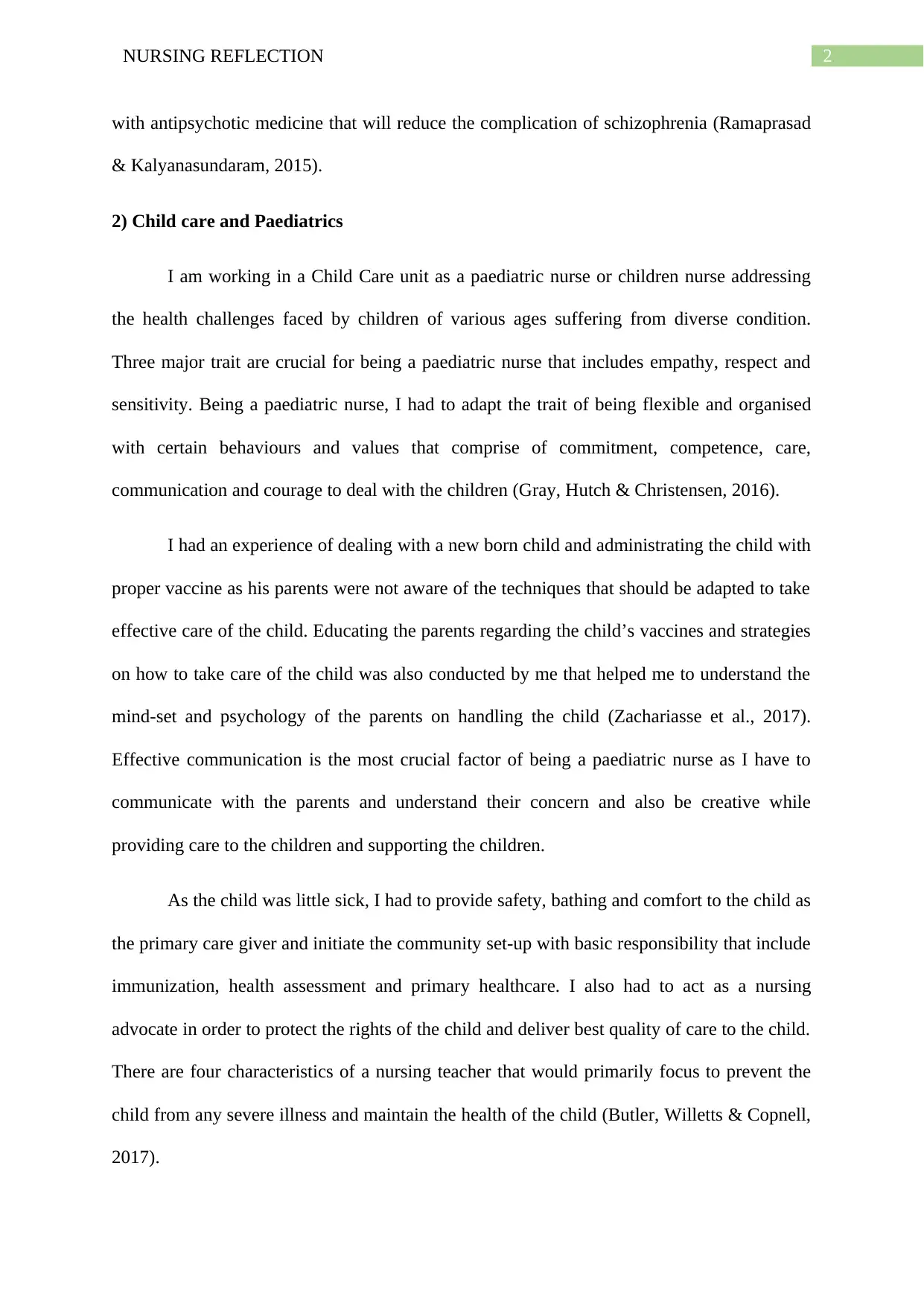
2NURSING REFLECTION
with antipsychotic medicine that will reduce the complication of schizophrenia (Ramaprasad
& Kalyanasundaram, 2015).
2) Child care and Paediatrics
I am working in a Child Care unit as a paediatric nurse or children nurse addressing
the health challenges faced by children of various ages suffering from diverse condition.
Three major trait are crucial for being a paediatric nurse that includes empathy, respect and
sensitivity. Being a paediatric nurse, I had to adapt the trait of being flexible and organised
with certain behaviours and values that comprise of commitment, competence, care,
communication and courage to deal with the children (Gray, Hutch & Christensen, 2016).
I had an experience of dealing with a new born child and administrating the child with
proper vaccine as his parents were not aware of the techniques that should be adapted to take
effective care of the child. Educating the parents regarding the child’s vaccines and strategies
on how to take care of the child was also conducted by me that helped me to understand the
mind-set and psychology of the parents on handling the child (Zachariasse et al., 2017).
Effective communication is the most crucial factor of being a paediatric nurse as I have to
communicate with the parents and understand their concern and also be creative while
providing care to the children and supporting the children.
As the child was little sick, I had to provide safety, bathing and comfort to the child as
the primary care giver and initiate the community set-up with basic responsibility that include
immunization, health assessment and primary healthcare. I also had to act as a nursing
advocate in order to protect the rights of the child and deliver best quality of care to the child.
There are four characteristics of a nursing teacher that would primarily focus to prevent the
child from any severe illness and maintain the health of the child (Butler, Willetts & Copnell,
2017).
with antipsychotic medicine that will reduce the complication of schizophrenia (Ramaprasad
& Kalyanasundaram, 2015).
2) Child care and Paediatrics
I am working in a Child Care unit as a paediatric nurse or children nurse addressing
the health challenges faced by children of various ages suffering from diverse condition.
Three major trait are crucial for being a paediatric nurse that includes empathy, respect and
sensitivity. Being a paediatric nurse, I had to adapt the trait of being flexible and organised
with certain behaviours and values that comprise of commitment, competence, care,
communication and courage to deal with the children (Gray, Hutch & Christensen, 2016).
I had an experience of dealing with a new born child and administrating the child with
proper vaccine as his parents were not aware of the techniques that should be adapted to take
effective care of the child. Educating the parents regarding the child’s vaccines and strategies
on how to take care of the child was also conducted by me that helped me to understand the
mind-set and psychology of the parents on handling the child (Zachariasse et al., 2017).
Effective communication is the most crucial factor of being a paediatric nurse as I have to
communicate with the parents and understand their concern and also be creative while
providing care to the children and supporting the children.
As the child was little sick, I had to provide safety, bathing and comfort to the child as
the primary care giver and initiate the community set-up with basic responsibility that include
immunization, health assessment and primary healthcare. I also had to act as a nursing
advocate in order to protect the rights of the child and deliver best quality of care to the child.
There are four characteristics of a nursing teacher that would primarily focus to prevent the
child from any severe illness and maintain the health of the child (Butler, Willetts & Copnell,
2017).
⊘ This is a preview!⊘
Do you want full access?
Subscribe today to unlock all pages.

Trusted by 1+ million students worldwide
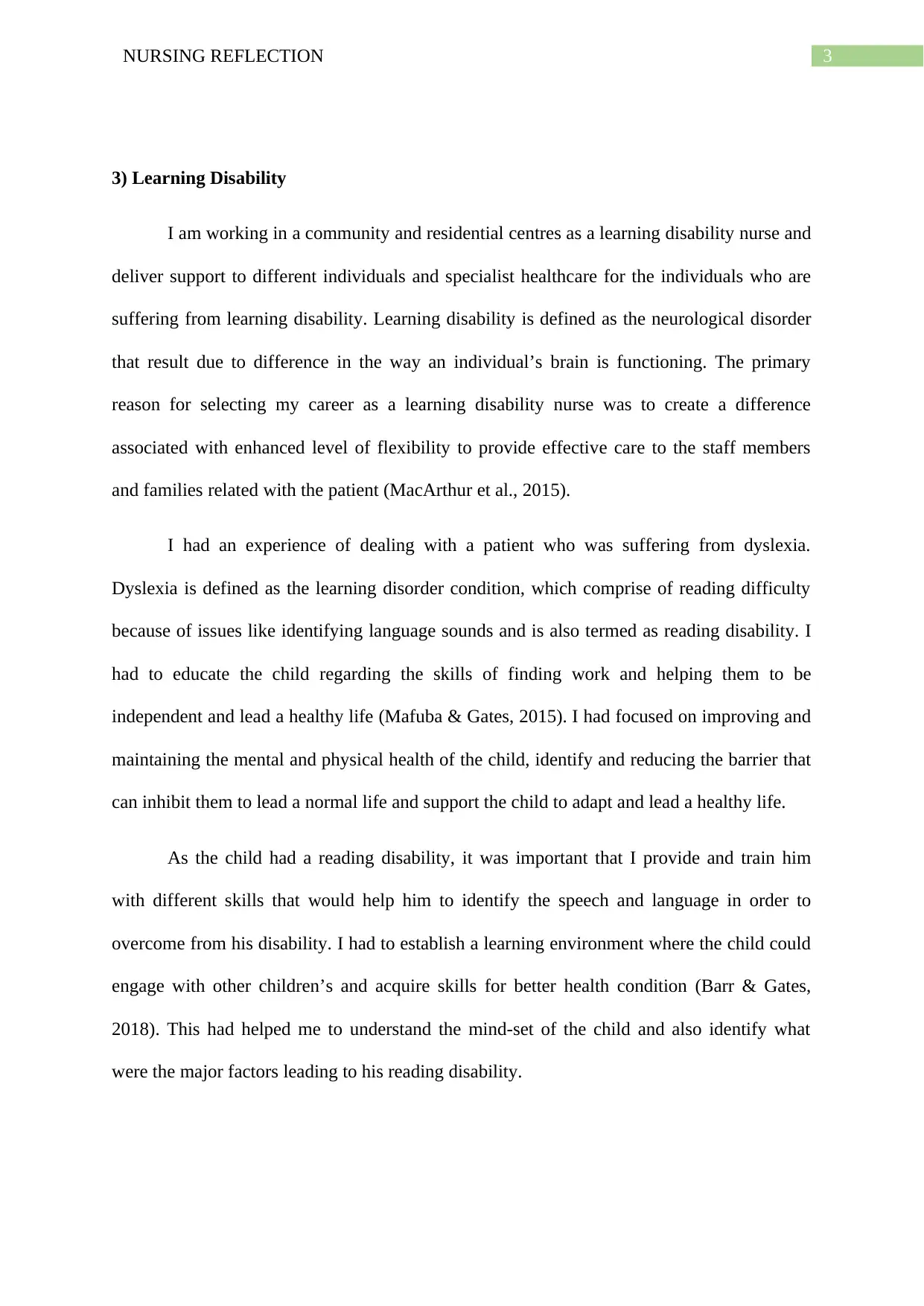
3NURSING REFLECTION
3) Learning Disability
I am working in a community and residential centres as a learning disability nurse and
deliver support to different individuals and specialist healthcare for the individuals who are
suffering from learning disability. Learning disability is defined as the neurological disorder
that result due to difference in the way an individual’s brain is functioning. The primary
reason for selecting my career as a learning disability nurse was to create a difference
associated with enhanced level of flexibility to provide effective care to the staff members
and families related with the patient (MacArthur et al., 2015).
I had an experience of dealing with a patient who was suffering from dyslexia.
Dyslexia is defined as the learning disorder condition, which comprise of reading difficulty
because of issues like identifying language sounds and is also termed as reading disability. I
had to educate the child regarding the skills of finding work and helping them to be
independent and lead a healthy life (Mafuba & Gates, 2015). I had focused on improving and
maintaining the mental and physical health of the child, identify and reducing the barrier that
can inhibit them to lead a normal life and support the child to adapt and lead a healthy life.
As the child had a reading disability, it was important that I provide and train him
with different skills that would help him to identify the speech and language in order to
overcome from his disability. I had to establish a learning environment where the child could
engage with other children’s and acquire skills for better health condition (Barr & Gates,
2018). This had helped me to understand the mind-set of the child and also identify what
were the major factors leading to his reading disability.
3) Learning Disability
I am working in a community and residential centres as a learning disability nurse and
deliver support to different individuals and specialist healthcare for the individuals who are
suffering from learning disability. Learning disability is defined as the neurological disorder
that result due to difference in the way an individual’s brain is functioning. The primary
reason for selecting my career as a learning disability nurse was to create a difference
associated with enhanced level of flexibility to provide effective care to the staff members
and families related with the patient (MacArthur et al., 2015).
I had an experience of dealing with a patient who was suffering from dyslexia.
Dyslexia is defined as the learning disorder condition, which comprise of reading difficulty
because of issues like identifying language sounds and is also termed as reading disability. I
had to educate the child regarding the skills of finding work and helping them to be
independent and lead a healthy life (Mafuba & Gates, 2015). I had focused on improving and
maintaining the mental and physical health of the child, identify and reducing the barrier that
can inhibit them to lead a normal life and support the child to adapt and lead a healthy life.
As the child had a reading disability, it was important that I provide and train him
with different skills that would help him to identify the speech and language in order to
overcome from his disability. I had to establish a learning environment where the child could
engage with other children’s and acquire skills for better health condition (Barr & Gates,
2018). This had helped me to understand the mind-set of the child and also identify what
were the major factors leading to his reading disability.
Paraphrase This Document
Need a fresh take? Get an instant paraphrase of this document with our AI Paraphraser
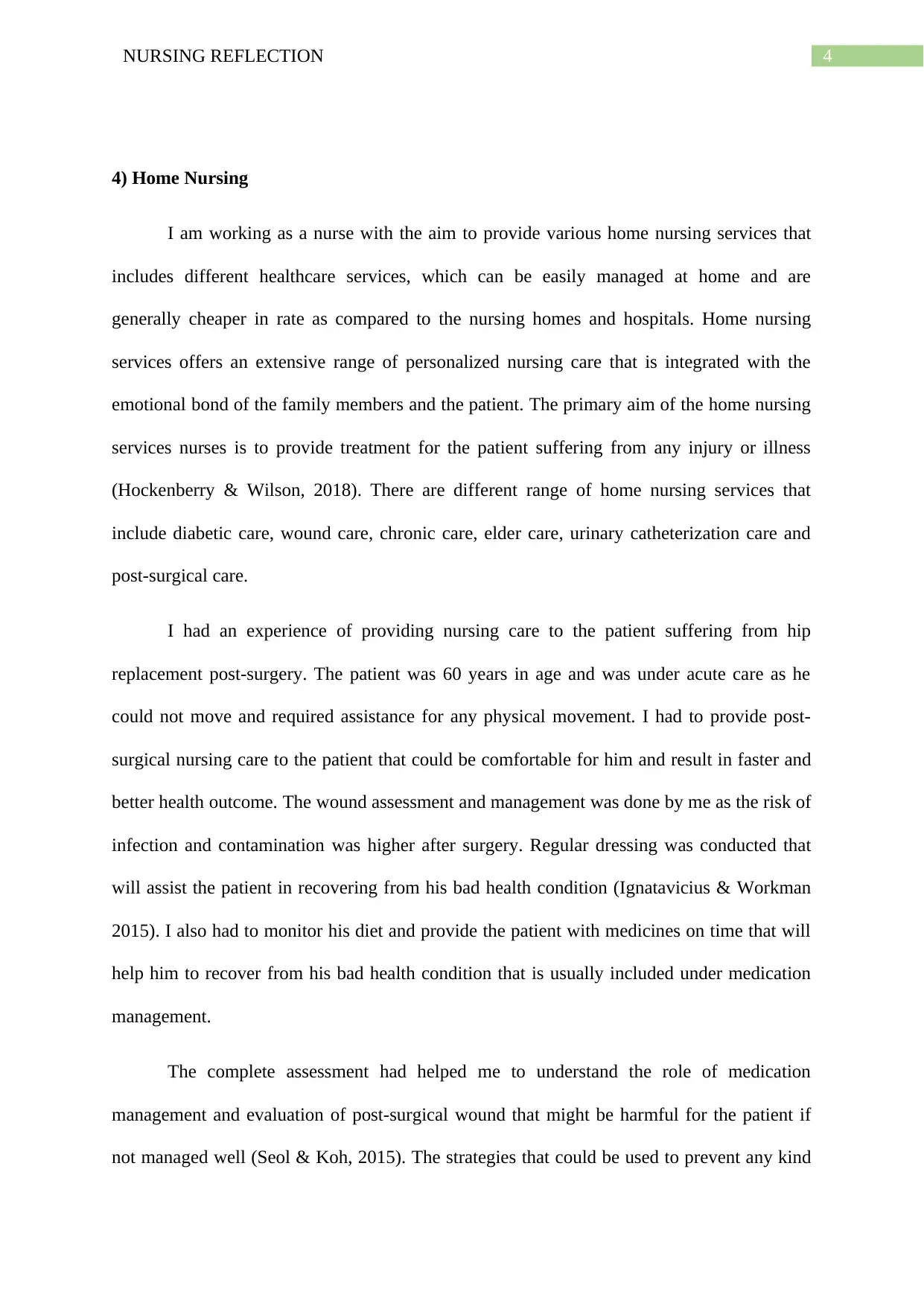
4NURSING REFLECTION
4) Home Nursing
I am working as a nurse with the aim to provide various home nursing services that
includes different healthcare services, which can be easily managed at home and are
generally cheaper in rate as compared to the nursing homes and hospitals. Home nursing
services offers an extensive range of personalized nursing care that is integrated with the
emotional bond of the family members and the patient. The primary aim of the home nursing
services nurses is to provide treatment for the patient suffering from any injury or illness
(Hockenberry & Wilson, 2018). There are different range of home nursing services that
include diabetic care, wound care, chronic care, elder care, urinary catheterization care and
post-surgical care.
I had an experience of providing nursing care to the patient suffering from hip
replacement post-surgery. The patient was 60 years in age and was under acute care as he
could not move and required assistance for any physical movement. I had to provide post-
surgical nursing care to the patient that could be comfortable for him and result in faster and
better health outcome. The wound assessment and management was done by me as the risk of
infection and contamination was higher after surgery. Regular dressing was conducted that
will assist the patient in recovering from his bad health condition (Ignatavicius & Workman
2015). I also had to monitor his diet and provide the patient with medicines on time that will
help him to recover from his bad health condition that is usually included under medication
management.
The complete assessment had helped me to understand the role of medication
management and evaluation of post-surgical wound that might be harmful for the patient if
not managed well (Seol & Koh, 2015). The strategies that could be used to prevent any kind
4) Home Nursing
I am working as a nurse with the aim to provide various home nursing services that
includes different healthcare services, which can be easily managed at home and are
generally cheaper in rate as compared to the nursing homes and hospitals. Home nursing
services offers an extensive range of personalized nursing care that is integrated with the
emotional bond of the family members and the patient. The primary aim of the home nursing
services nurses is to provide treatment for the patient suffering from any injury or illness
(Hockenberry & Wilson, 2018). There are different range of home nursing services that
include diabetic care, wound care, chronic care, elder care, urinary catheterization care and
post-surgical care.
I had an experience of providing nursing care to the patient suffering from hip
replacement post-surgery. The patient was 60 years in age and was under acute care as he
could not move and required assistance for any physical movement. I had to provide post-
surgical nursing care to the patient that could be comfortable for him and result in faster and
better health outcome. The wound assessment and management was done by me as the risk of
infection and contamination was higher after surgery. Regular dressing was conducted that
will assist the patient in recovering from his bad health condition (Ignatavicius & Workman
2015). I also had to monitor his diet and provide the patient with medicines on time that will
help him to recover from his bad health condition that is usually included under medication
management.
The complete assessment had helped me to understand the role of medication
management and evaluation of post-surgical wound that might be harmful for the patient if
not managed well (Seol & Koh, 2015). The strategies that could be used to prevent any kind
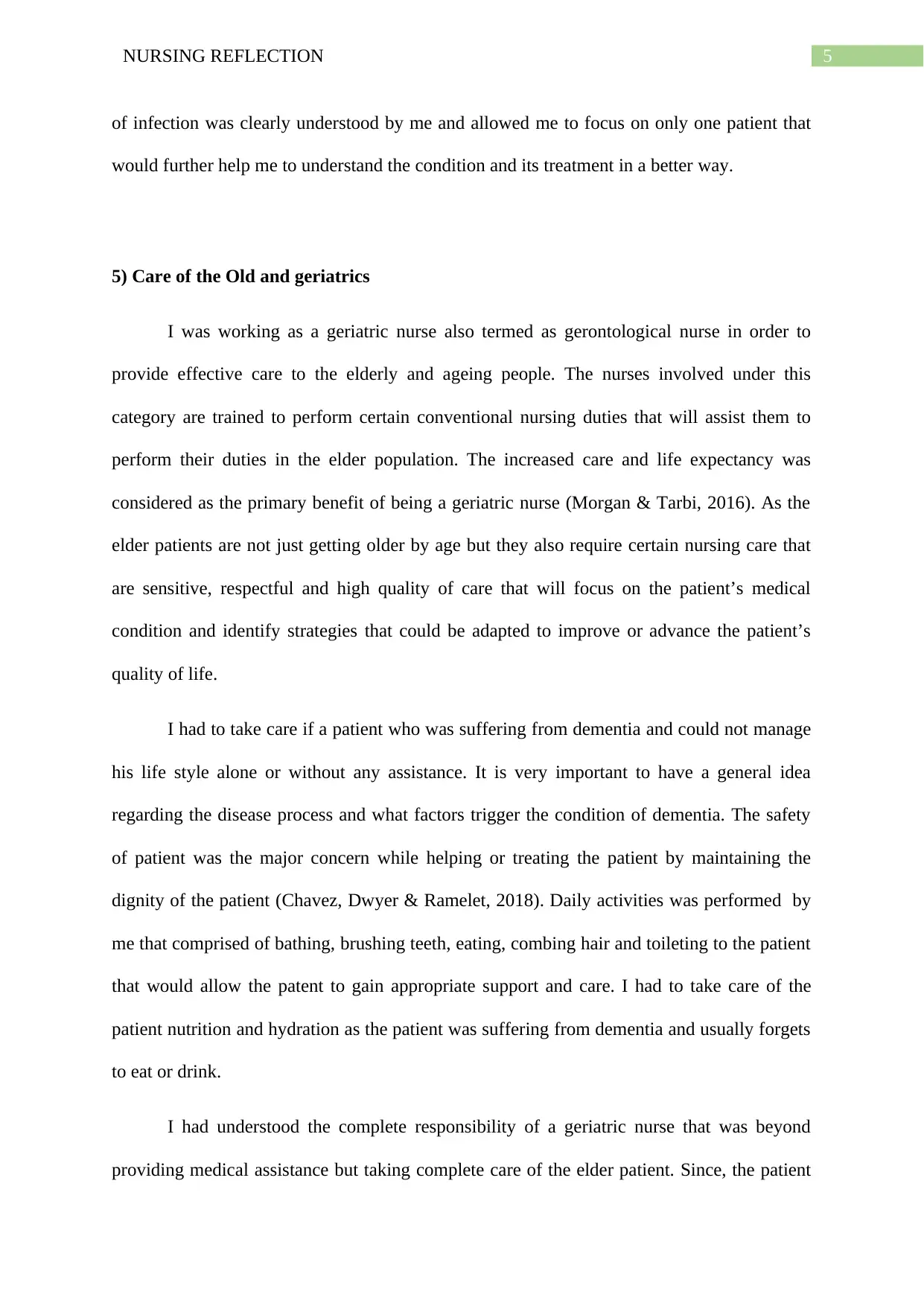
5NURSING REFLECTION
of infection was clearly understood by me and allowed me to focus on only one patient that
would further help me to understand the condition and its treatment in a better way.
5) Care of the Old and geriatrics
I was working as a geriatric nurse also termed as gerontological nurse in order to
provide effective care to the elderly and ageing people. The nurses involved under this
category are trained to perform certain conventional nursing duties that will assist them to
perform their duties in the elder population. The increased care and life expectancy was
considered as the primary benefit of being a geriatric nurse (Morgan & Tarbi, 2016). As the
elder patients are not just getting older by age but they also require certain nursing care that
are sensitive, respectful and high quality of care that will focus on the patient’s medical
condition and identify strategies that could be adapted to improve or advance the patient’s
quality of life.
I had to take care if a patient who was suffering from dementia and could not manage
his life style alone or without any assistance. It is very important to have a general idea
regarding the disease process and what factors trigger the condition of dementia. The safety
of patient was the major concern while helping or treating the patient by maintaining the
dignity of the patient (Chavez, Dwyer & Ramelet, 2018). Daily activities was performed by
me that comprised of bathing, brushing teeth, eating, combing hair and toileting to the patient
that would allow the patent to gain appropriate support and care. I had to take care of the
patient nutrition and hydration as the patient was suffering from dementia and usually forgets
to eat or drink.
I had understood the complete responsibility of a geriatric nurse that was beyond
providing medical assistance but taking complete care of the elder patient. Since, the patient
of infection was clearly understood by me and allowed me to focus on only one patient that
would further help me to understand the condition and its treatment in a better way.
5) Care of the Old and geriatrics
I was working as a geriatric nurse also termed as gerontological nurse in order to
provide effective care to the elderly and ageing people. The nurses involved under this
category are trained to perform certain conventional nursing duties that will assist them to
perform their duties in the elder population. The increased care and life expectancy was
considered as the primary benefit of being a geriatric nurse (Morgan & Tarbi, 2016). As the
elder patients are not just getting older by age but they also require certain nursing care that
are sensitive, respectful and high quality of care that will focus on the patient’s medical
condition and identify strategies that could be adapted to improve or advance the patient’s
quality of life.
I had to take care if a patient who was suffering from dementia and could not manage
his life style alone or without any assistance. It is very important to have a general idea
regarding the disease process and what factors trigger the condition of dementia. The safety
of patient was the major concern while helping or treating the patient by maintaining the
dignity of the patient (Chavez, Dwyer & Ramelet, 2018). Daily activities was performed by
me that comprised of bathing, brushing teeth, eating, combing hair and toileting to the patient
that would allow the patent to gain appropriate support and care. I had to take care of the
patient nutrition and hydration as the patient was suffering from dementia and usually forgets
to eat or drink.
I had understood the complete responsibility of a geriatric nurse that was beyond
providing medical assistance but taking complete care of the elder patient. Since, the patient
⊘ This is a preview!⊘
Do you want full access?
Subscribe today to unlock all pages.

Trusted by 1+ million students worldwide
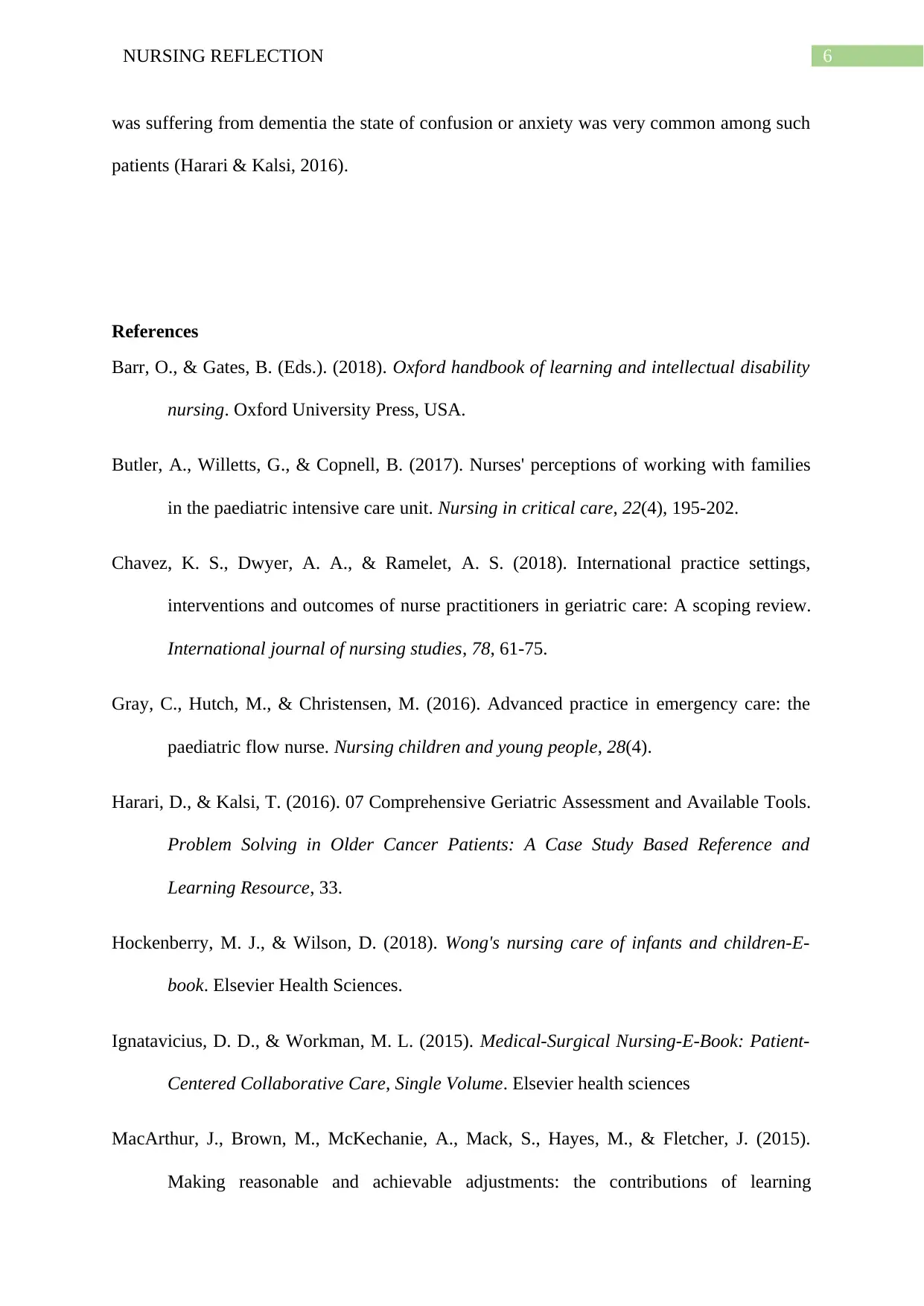
6NURSING REFLECTION
was suffering from dementia the state of confusion or anxiety was very common among such
patients (Harari & Kalsi, 2016).
References
Barr, O., & Gates, B. (Eds.). (2018). Oxford handbook of learning and intellectual disability
nursing. Oxford University Press, USA.
Butler, A., Willetts, G., & Copnell, B. (2017). Nurses' perceptions of working with families
in the paediatric intensive care unit. Nursing in critical care, 22(4), 195-202.
Chavez, K. S., Dwyer, A. A., & Ramelet, A. S. (2018). International practice settings,
interventions and outcomes of nurse practitioners in geriatric care: A scoping review.
International journal of nursing studies, 78, 61-75.
Gray, C., Hutch, M., & Christensen, M. (2016). Advanced practice in emergency care: the
paediatric flow nurse. Nursing children and young people, 28(4).
Harari, D., & Kalsi, T. (2016). 07 Comprehensive Geriatric Assessment and Available Tools.
Problem Solving in Older Cancer Patients: A Case Study Based Reference and
Learning Resource, 33.
Hockenberry, M. J., & Wilson, D. (2018). Wong's nursing care of infants and children-E-
book. Elsevier Health Sciences.
Ignatavicius, D. D., & Workman, M. L. (2015). Medical-Surgical Nursing-E-Book: Patient-
Centered Collaborative Care, Single Volume. Elsevier health sciences
MacArthur, J., Brown, M., McKechanie, A., Mack, S., Hayes, M., & Fletcher, J. (2015).
Making reasonable and achievable adjustments: the contributions of learning
was suffering from dementia the state of confusion or anxiety was very common among such
patients (Harari & Kalsi, 2016).
References
Barr, O., & Gates, B. (Eds.). (2018). Oxford handbook of learning and intellectual disability
nursing. Oxford University Press, USA.
Butler, A., Willetts, G., & Copnell, B. (2017). Nurses' perceptions of working with families
in the paediatric intensive care unit. Nursing in critical care, 22(4), 195-202.
Chavez, K. S., Dwyer, A. A., & Ramelet, A. S. (2018). International practice settings,
interventions and outcomes of nurse practitioners in geriatric care: A scoping review.
International journal of nursing studies, 78, 61-75.
Gray, C., Hutch, M., & Christensen, M. (2016). Advanced practice in emergency care: the
paediatric flow nurse. Nursing children and young people, 28(4).
Harari, D., & Kalsi, T. (2016). 07 Comprehensive Geriatric Assessment and Available Tools.
Problem Solving in Older Cancer Patients: A Case Study Based Reference and
Learning Resource, 33.
Hockenberry, M. J., & Wilson, D. (2018). Wong's nursing care of infants and children-E-
book. Elsevier Health Sciences.
Ignatavicius, D. D., & Workman, M. L. (2015). Medical-Surgical Nursing-E-Book: Patient-
Centered Collaborative Care, Single Volume. Elsevier health sciences
MacArthur, J., Brown, M., McKechanie, A., Mack, S., Hayes, M., & Fletcher, J. (2015).
Making reasonable and achievable adjustments: the contributions of learning
Paraphrase This Document
Need a fresh take? Get an instant paraphrase of this document with our AI Paraphraser
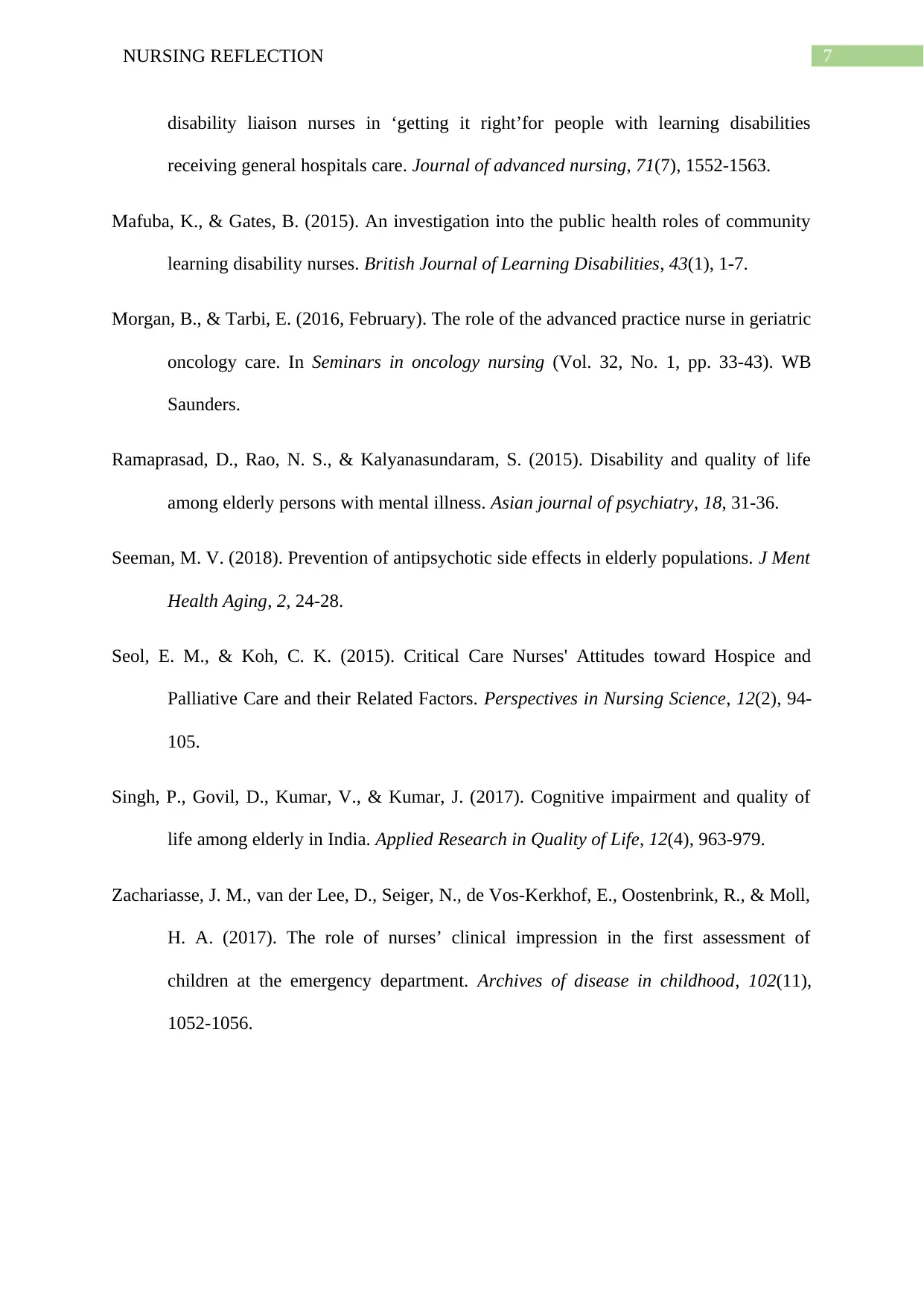
7NURSING REFLECTION
disability liaison nurses in ‘getting it right’for people with learning disabilities
receiving general hospitals care. Journal of advanced nursing, 71(7), 1552-1563.
Mafuba, K., & Gates, B. (2015). An investigation into the public health roles of community
learning disability nurses. British Journal of Learning Disabilities, 43(1), 1-7.
Morgan, B., & Tarbi, E. (2016, February). The role of the advanced practice nurse in geriatric
oncology care. In Seminars in oncology nursing (Vol. 32, No. 1, pp. 33-43). WB
Saunders.
Ramaprasad, D., Rao, N. S., & Kalyanasundaram, S. (2015). Disability and quality of life
among elderly persons with mental illness. Asian journal of psychiatry, 18, 31-36.
Seeman, M. V. (2018). Prevention of antipsychotic side effects in elderly populations. J Ment
Health Aging, 2, 24-28.
Seol, E. M., & Koh, C. K. (2015). Critical Care Nurses' Attitudes toward Hospice and
Palliative Care and their Related Factors. Perspectives in Nursing Science, 12(2), 94-
105.
Singh, P., Govil, D., Kumar, V., & Kumar, J. (2017). Cognitive impairment and quality of
life among elderly in India. Applied Research in Quality of Life, 12(4), 963-979.
Zachariasse, J. M., van der Lee, D., Seiger, N., de Vos-Kerkhof, E., Oostenbrink, R., & Moll,
H. A. (2017). The role of nurses’ clinical impression in the first assessment of
children at the emergency department. Archives of disease in childhood, 102(11),
1052-1056.
disability liaison nurses in ‘getting it right’for people with learning disabilities
receiving general hospitals care. Journal of advanced nursing, 71(7), 1552-1563.
Mafuba, K., & Gates, B. (2015). An investigation into the public health roles of community
learning disability nurses. British Journal of Learning Disabilities, 43(1), 1-7.
Morgan, B., & Tarbi, E. (2016, February). The role of the advanced practice nurse in geriatric
oncology care. In Seminars in oncology nursing (Vol. 32, No. 1, pp. 33-43). WB
Saunders.
Ramaprasad, D., Rao, N. S., & Kalyanasundaram, S. (2015). Disability and quality of life
among elderly persons with mental illness. Asian journal of psychiatry, 18, 31-36.
Seeman, M. V. (2018). Prevention of antipsychotic side effects in elderly populations. J Ment
Health Aging, 2, 24-28.
Seol, E. M., & Koh, C. K. (2015). Critical Care Nurses' Attitudes toward Hospice and
Palliative Care and their Related Factors. Perspectives in Nursing Science, 12(2), 94-
105.
Singh, P., Govil, D., Kumar, V., & Kumar, J. (2017). Cognitive impairment and quality of
life among elderly in India. Applied Research in Quality of Life, 12(4), 963-979.
Zachariasse, J. M., van der Lee, D., Seiger, N., de Vos-Kerkhof, E., Oostenbrink, R., & Moll,
H. A. (2017). The role of nurses’ clinical impression in the first assessment of
children at the emergency department. Archives of disease in childhood, 102(11),
1052-1056.

8NURSING REFLECTION
⊘ This is a preview!⊘
Do you want full access?
Subscribe today to unlock all pages.

Trusted by 1+ million students worldwide
1 out of 9
Related Documents
Your All-in-One AI-Powered Toolkit for Academic Success.
+13062052269
info@desklib.com
Available 24*7 on WhatsApp / Email
![[object Object]](/_next/static/media/star-bottom.7253800d.svg)
Unlock your academic potential
Copyright © 2020–2025 A2Z Services. All Rights Reserved. Developed and managed by ZUCOL.





